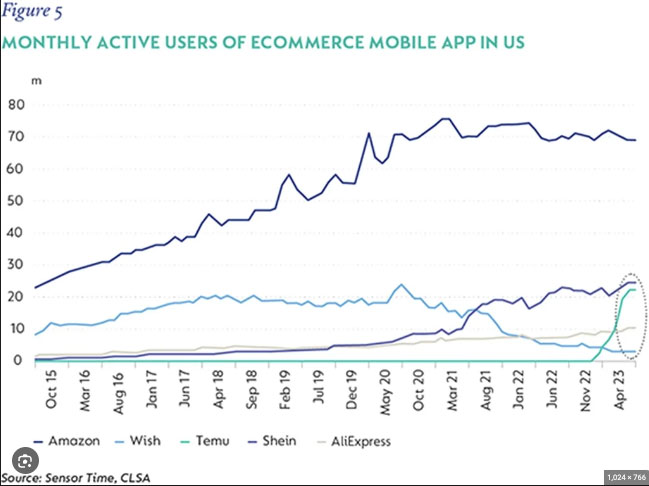According to Wired magazine, Temu is losing hundreds of millions of dollars to send you cheap stuff from China in order to grab mass market share from US shoppers…and it’s working.
Check out this growth graph comparing Temu to Amazon in terms of traffic. In less than 1 year, Temu already has one-third the monthly active users of Amazon.
From $3.37 for a pair of shoes to just $4.57 for a womens sweater, these prices seem too good to be true.
And it turns out that they are. An analysis of the company’s supply chain costs by WIRED magazine, which was confirmed by a company insider, shows that Temu is losing an average of $30 for every order made.
In addition to the US, Temu also operates in Canada, Australia, and New Zealand and is estimated to be losing $588 million to $954 million every year.
But is Temu ethical? And are their unfair business practices hurting US businesses? This post will answer this exact question.
Get My Free Mini Course On How To Start A Successful Ecommerce Store
If you are interested in starting an ecommerce business, I put together a comprehensive package of resources that will help you launch your own online store from complete scratch. Be sure to grab it before you leave!
Temu’s Affect On US Retail
According to Amazon reps, the apparel sector of Amazon is down 30% year over year because of cheap discount sites like Temu and Shein.
Recently, I interviewed my friend Jerry Kozak on my podcast, who runs an online store selling t-shirts both on Amazon and his Shopify store, that makes over 8 figures per year.
And according to Jerry, he believes that companies like Temu and Shein are taking sales away from his company, especially on Amazon.
Ever since both Temu and Shein burst onto the US scene in 2022, Jerry’s business has cratered by nearly 50%. Now granted, Jerry is in the t-shirt business which is one of the most saturated and most competitive niches to sell into.
But he’s not alone. Other apparel and t-shirt companies in ecommerce communities that I belong to are down year over year as well.
Right now, companies like Temu and Shein seem to be mainly hurting lower end apparel businesses without a powerful brand or intellectual property.
Temu’s Big Advantages Over US Companies
Temu has 2 gigantic advantages over US companies when it comes to making and selling apparel online, cheap labor and the de minimus rule.
Are Temu’s Low Labor Costs Ethical?
Temu has a huge cost advantage over US sellers because of extremely low labor costs but Temu’s ethics have come into question due to alleged slave labor practices.
According to the LA Times, products made in China’s western province of Xinjiang are being sold to US consumers through Temu in breach of a ban that forbids goods from being imported from the region due to links to forced and slave labor.
Statements from former detainees and reports from an array of researchers and advocacy groups have alleged that the Chinese government put more than 1 million people in detention camps in that region and that laborers in fields and factories were forced or coerced to make cheap products for Temu.
The Chinese government has said the camps are for reeducation purposes but do you believe them?
No one knows for sure, but slave labor could be one way that Temu is commanding such low prices.
For context, a blank t-shirt costs about $2 and shipping within the continental US is about $4. This is the rough cost for a business in the United States and in order to make a decent profit after printing a custom design, you have to be able to sell the shirt for at least $20.
Meanwhile, Temu is selling a printed t-shirt direct from China to a US address for less than $7 which includes shipping. So they can literally sell apparel at or below the minimum cost.
The De Minimis Loophole
The second reason Temu has an advantage is due to the de minimis loophole that allows Chinese sellers to not have to pay taxes, tariffs or customs duties.
The de minimis loophole is that any shipment sent into the US that is valued at less than $800 does not have to pay any taxes whatsoever. Because Temu is shipping individual products into the United States, they don’t have to pay any customs duties or taxes at all.
Meanwhile, in order for a US apparel company to get low pricing, they have to import a large quantity of t-shirts into the US and pay both customs duties and tariffs on the products. Whether this is fair or not is up to you.
Temu Prices Vs US Prices
To illustrate the vast disparity in price between Temu and a typical US seller, here’s a full example with prices.
A printed t-shirt on Temu costs $7.00 including shipping. There are no import duties and the product arrives in 1 week.
The wholesale cost for the same item made in USA costs $10.00 and retails for $19.99.
This huge discrepancy is a problem and some people believe Temu is a scam because the math doesn’t work out.
Temu Is Squeezing Chinese Suppliers
At the same time, Temu is squeezing small manufacturers in China to cut prices to even lower levels that makes it impossible for even Chinese manufacturers to make a profit.
One Chinese manufacturer who goes by Tai Shi, was approached by Temu to sell on the platform when it launched in 2022. He joined but soon found that he had little control over pricing.
Temu will often ask to lower prices and, if you agree, the platform will decide what that lower price is. You don’t have a say over your pricing and if you refuse to lower your price, you simply won’t be listed on the platform.
This is their method of operation. Temu’s parent company Pinduoduo burst onto the scene in China by providing deep discounts to gain marketshare as well.
The formula works. Offer impossibly low prices to shut everyone out and lose a ton of money for many years, and then once you’ve become a household name, raise prices and turn a profit. This is exactly what Temu is trying to do.
The difference this time, is that Chinese companies like Temu have the advantage of favorable taxation and impossibly cheap labor compared to US based companies.
They don’t have to pay taxes at all and they can get away with paying their staff pennies on the dollar.
Will Temu Run Out Of Money?
Temu’s low prices is costing the company a ton of money and they are estimated to be losing $30 per order and hundreds of millions of dollars per year.
Temu is also squeezing their suppliers to get the lowest pricing possible and many Chinese sellers are leaving Temu in droves.
Meanwhile, Temu is also gathering data from millions of US citizens which is attracting the scrutiny of the US government. Something has to give eventually.
But on the flip side, US citizens are in a precarious situation. The average American is carrying a record amount of credit card debt and the savings rate is at an all time low which makes for the perfect storm for a company like Temu to thrive.
How To Beat Temu
As a small business owner, what can you do to compete against Temu? The answer depends on what you sell and the strength of your brand.
If you are selling commodity products that do not have a strong value proposition, you aren’t going to survive regardless of whether Temu or Shein exists or not.
For example, if you are selling generic t-shirts that are easily copied by manufacturers from China who have a cost advantage over you, you aren’t going to survive.
But, if you can tap into the emotions of your buyer and establish a strong brand, you’ll survive regardless of pricing pressure.
True Classic tees is the perfect example. True classic tees is a company that sells generic solid colored tshirts which is one of the most saturated and competitive niches out there.
But they’ve brought in over $250 million since they opened in 2019.
How does a blank t-shirt company that sells plain shirts for $25 per shirt make so much money? It’s all about the marketing and how they make consumers feel about their product.
If you’ve never watched a true classic tees commercial, basically they show an overweight guy wearing a shirt with his beer belly hanging out that doesn’t fit at all.
Then, they flash forward to a picture of the exact same overweight man in a True Classic T shirt and all of a sudden he looks fit. The t-shirt emphasizes his biceps and hides his beer belly.
Can Temu sell a plain t-shirt for $3? Yes. But it can’t replicate the mind share that True Classic Tees has created.
Selling online is about triggering the emotions of your consumer and it’s not all about price. I’d rather pay $25 for a shirt that makes me look and feel good rather than a cheap throw away $3 t-shirt.
Another good example is how Dr.Squatch sells mens soap. Most men don’t care about soap they use in the shower but Dr.Squatch has made hundreds of millions of dollars by appealing to a man’s emotions.
Instead of telling consumers about how good their soap smells or how well the soap cleans and exfoliates, Dr.Squatch sells soap by catering to the sexual desires of men.
In almost all of their commercials, they show a woman smelling her man saying words like “Man, you smell so good. I want to jump you right now”.
And when a man watches a commercial like that, they are led to believe that the soap will get them more action in bed.
Can Temu sell a bar of soap at half the price? Definitely. But can they compete with Dr.Squatch? Probably not.
Right now, Temu is a junk yard that sells cheap generic products from China and their low pricing is affecting the apparel industry the most because apparel is a commodity.
Most clothing sold on Amazon is generic and unbranded.
Will Temu Destroy US Businesses?
Temu will destroy most commodity ecommerce businesses in the United States and in order to survive, you have to have a strong value proposition.
Earlier, I told you about how my friend Jerry Kozak’s business dropped around 50% but he’s going to be just fine. The other half of his business does not depend on sales from Amazon nor is it price sensitive.
The other half of his tshirt business is where he custom prints products for NATO, college sports teams and other organizations.
The other half of his business is where he’s established a solid repeat customer base and strong relationships with his customers. These are customers that he will never lose.
His added value is his customer service, his attention to detail and the loyalty he’s built over time. This is what it takes to create a lasting ecommerce business.
While Temu will destroy the low end apparel market, you can succeed as a small business owner by niching down and targeting high end customers. If you compete purely based on price, you’ve already lost.
As for the unfair advantages that Temu currently possesses, the US government may have to step in. The De Minimis rules that prevent Chinese sellers from having to pay US taxes is anti-competitive.
And you can show your support for safe labor practices by not buying from Temu at all.

Ready To Get Serious About Starting An Online Business?
If you are really considering starting your own online business, then you have to check out my free mini course on How To Create A Niche Online Store In 5 Easy Steps.
In this 6 day mini course, I reveal the steps that my wife and I took to earn 100 thousand dollars in the span of just a year. Best of all, it's free and you'll receive weekly ecommerce tips and strategies!
Related Posts In Ecommerce Marketplaces
- Is Redbubble Legit? A Full Review For Creators And Shoppers
- 14 Amazon Alternatives And Sites Like Amazon To Sell Products Online
- Is Farfetch Legit? My Review Of This Luxury Brand Platform
- Alibaba vs Amazon – Who’s Dominating Ecommerce And Key Differences
- Amazon Vs Walmart: Which Marketplace Is Better For Online Sellers?

Steve Chou is a highly recognized influencer in the ecommerce space and has taught thousands of students how to effectively sell physical products online over at ProfitableOnlineStore.com.
His blog, MyWifeQuitHerJob.com, has been featured in Forbes, Inc, The New York Times, Entrepreneur and MSNBC.
He's also a contributing author for BigCommerce, Klaviyo, ManyChat, Printful, Privy, CXL, Ecommerce Fuel, GlockApps, Privy, Social Media Examiner, Web Designer Depot, Sumo and other leading business publications.
In addition, he runs a popular ecommerce podcast, My Wife Quit Her Job, which is a top 25 marketing show on all of Apple Podcasts.
To stay up to date with all of the latest ecommerce trends, Steve runs a 7 figure ecommerce store, BumblebeeLinens.com, with his wife and puts on an annual ecommerce conference called The Sellers Summit.
Steve carries both a bachelors and a masters degree in electrical engineering from Stanford University. Despite majoring in electrical engineering, he spent a good portion of his graduate education studying entrepreneurship and the mechanics of running small businesses.


















